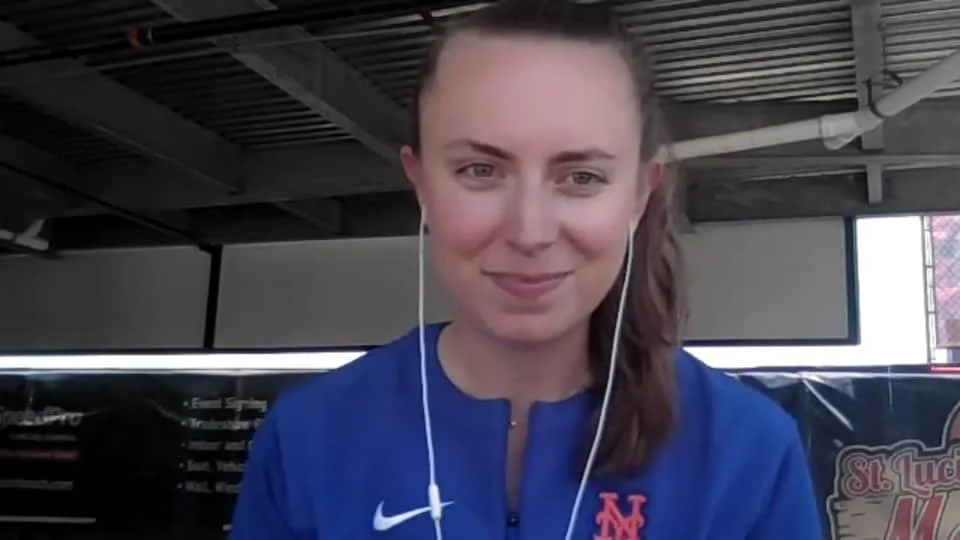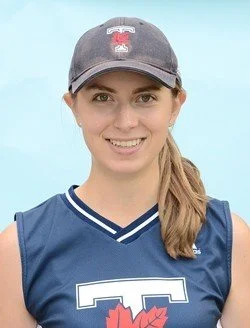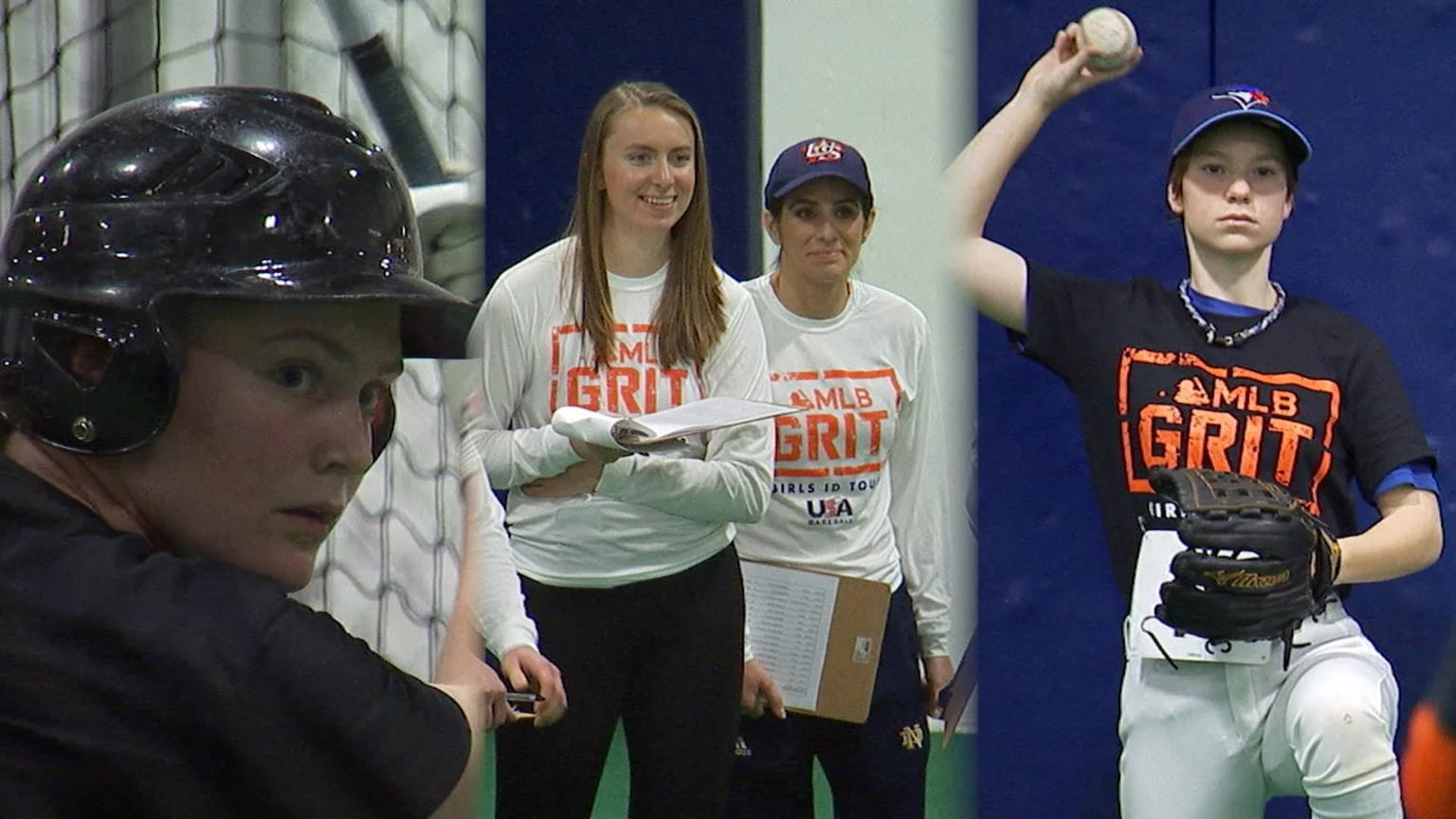Inspiring Benn blazing trail in Mets’ executive ranks
Toronto native Elizabeth Benn is enjoying her new role as director of Major League operations with the New York Mets. Her position makes her the highest ranking female in baseball operations in the franchise’s history. Photo: Radio Canada
April 2, 2022
By Kevin Glew
Canadian Baseball Network
Someone recently asked Elizabeth Benn for her autograph at the New York Mets spring training complex in Port St. Lucie, Fla.
She was surprised by the request, but she shouldn’t be.
After all, the modest Canadian is only 28 and has rocketed to the position of director of Major League operations for the Mets. It’s a job that not only makes her the highest ranking female in baseball operations in the franchise’s history, but also an inspiration to young women who have dreamed of landing such a lofty post in a male dominated industry.
“I feel like I’m not actually totally grasping it yet,” said Benn when asked about being seen as a role model and trailblazer. “I think that’s partially because my whole life since I was seven years old playing T-ball I’ve been the only girl or woman there. So this just feels kind of normal to me. I understand the weight of the title and I don’t brush that off at all, but being in this position just feels natural to me.
“I think when it does hit me is when I hear from girls from the MLB development program and they’re asking me about my job, and they’re saying, ‘Hey, that’s so cool, I think I want to do something like that.’”
Benn was hired by the Mets on Feb. 28 and it’s been a whirlwind for the determined and energetic Canadian ever since. She has done interviews with the MLB Network, SportsNet New York (SNY) and with her hometown Toronto Sun and Toronto Star, among other media outlets.
Now more than a month into her new position, she feels like she’s settling in. In her role as director of Major League operations, she is responsible for roster construction, management and transactions. She landed her new job after working in the Major League Baseball head office in New York for five years, most recently as senior coordinator of baseball operations.
“I’ve told people that as far as anything I would’ve wanted in a team and in a group of people to work with, the Mets checked every one of those boxes,” she said. “It was just such an amazing opportunity and I didn’t have to move, which is logistically helpful.”
* * *
But even Benn, who has been throwing a baseball since the time she could walk, couldn’t have fathomed that she would be working as a prominent baseball executive before she turned 30.
Born in Toronto in 1993, a month-and-a-half before Joe Carter clubbed his World Series-winning home run, she started tossing the ball around with her brother, Andrew, when she was two. Her mother Ann, who hails from New Jersey and is a diehard Yankees fan, also loved to play catch with her.
Benn played basketball, tennis and even figure skated growing up, but for as long as she can remember, she preferred to be on the diamond.
She began playing T-ball when she was seven and it was in that first season that she got a taste of the obstacles she was going to face as a female.
“When I was in T-ball, I was excited to play in the All-Star Game. It was a really high honour at the time, but one of the coaches came up to me and said, ‘Are you sure you want to do this? Are you sure you don’t want to hang out with your friends?’” recalled Benn. “I think that was the first time that I realized that some people didn’t really want me there.”
But from an early age, she was determined and passionate about the sport and her skills matched up well with the boys.
“When I was eight years old, I got what I thought then was the biggest honour when I got called up to fill in for teams that were short players for Little League,” she said.
The following year she joined High Park Little League and was the only girl on her team. High Park is one of the strongest Little League programs in Toronto, but Benn savored the opportunity to compete at such a high level.
“She played on two different minor teams with me and then I drafted her in the major division on my other team,” said Tom Haivarlis, who coached Benn from ages 9 to 11 at High Park.. “I kept drafting her because she was always getting better and she was always getting stronger and her baseball IQ was better than everybody else’s.”
Ken Sherbanowski, the current president of the High Park Little League Association, also coached Benn in her first season after T-ball.
“She was very quiet, but a decent baseball player,” recalled Sherbanowski. “She had a love of the game and as a coach, she was the perfect kind of child. Anything you asked her to do, she would try. She’d put her nose to the grindstone and she was very coachable and was always trying to do better.”
Recently, Sherbanowski dug out a list of players that were in same general age bracket as Benn at High Park. Benn would have competed against the likes of Anthony Camara, who was taken by the Boston Bruins in the third round of the 2011 NHL draft, Daniel Pinero and Daniel Procopio, who were selected in the MLB draft, and multiple others who earned baseball scholarships to U.S. colleges.
“She held her own against them,” said Sherbanowski. “I mean Anthony Camara had a very, very live arm and she never shied away from going up to bat when he was pitching.”
Haivarlis, the older brother of talented High Park C Greg Haivarlisd. idn’t hesitate to use Benn at almost any position, but he vividly remembers her pitching.
“We let her pitch and we put her in big situations all the time because I didn’t care if she failed because she was going to give more [effort] than anyone else. It meant more to her than it did to most other players,” said Haivarlis.
The veteran coach can’t recall a specific instance where parents complained about Benn being on the team and starting over a boy, but he does think there may have been an unspoken bias against her.
“I mean there’s a reason I was able to draft her three seasons in a row without any problem. People passed on her,” he said. “And it was because people didn’t know her and they just looked at her and saw this tall, lanky kid and she wasn’t the strongest and the best at anything and they just didn’t see the value. But she was as important as any player I ever had because of her love for the game and her focus . . . She was like a player/coach when she was 11.”
Benn, who grew up a Yankees fan, says the support from coaches like Haivarlis and Sherbanowski meant a lot to her. Unfortunately, not every coach was like them.
“I think it was when I was 13 and I tried out for a team and everyone got a call to find out whether they made it or not except for me. My tryout was just kind of completely ignored,” she recalled. “So that’s when I think I realized I was not going to have as many opportunities as others.”
Fortunately, Benn was resilient and driven even at that young age and that snub only fueled her fire to keep playing. In high school, she starred on the Humberside Collegiate Institute women’s softball team and went to dozens of Blue Jays games at Rogers Centre.
Benn starred for the University of Toronto softball team. Photo: U of T Athletics
After she graduated, she attended the University of Toronto where she suited up for the softball team and earned a Bachelor of Arts degree with a specialty in Philosophy. Her interest in Philosophy was inspired largely by professor Mark Kingwell, a well-known educator and author of the baseball book, Fail Better: Why Baseball Matters. Benn and Kingwell bonded over their shared interests.
Benn also talked to Kingwell about some of the obstacles she had faced in baseball.
“It was an ongoing pet peeve of hers that girls were supposed to play softball and that only men could play baseball,” said Kingwell. “And she had told me that she had grown up playing baseball with boys and U of T was holding out. They didn’t let girls play on the baseball team, so I could see that that bugged her a lot . . . I could see that the farther along she got in her career the more important it was going to be for her to break the barriers.”
Impressed by Benn’s determination and focus, Kingwell encouraged her to write a paper about the gender issues she had faced and to submit it for consideration for the annual symposium on baseball and American culture hosted by the National Baseball Hall of Fame in Cooperstown.
Two years later, while completing her master’s in Philosophy at Columbia University, Benn finished that paper, which was entitled “Baseball’s Gender Problem,” and submitted it. It was accepted and she presented it at the Cooperstown event.
“That ended up being a pivotal moment in my career because MLB found out that I presented that paper,” said Benn. “So in some ways, he [Kingwell] led to me to New York. He helped me get into Columbia into Philosophy and then after that, he helped me get my job at MLB because he was pushing me to do this paper which ended up being pivotal in my career.”
Also, while at Columbia, Benn became the first female to play in New York Metro Baseball, a highly competitive circuit for ex-college players and intense amateurs. She competed in the lower division in her first year and at the end of the year, her coach told her she’d never play at a higher level.
“He just directly told me, ‘You’re not going to succeed at the higher level. You’re not good enough. You’re never going to do it. Good luck trying to continue in baseball,’” recalled Benn. “So the next year, I decided I was going to play at the double-A level. I was going to play in the higher division. It was just natural for me to think that I was going to go to that higher level and make the team there. And that year was statistically my best year in the league. I think my ERA was under 3.00.”
Benn (second from left) has treasured her time working at MLB clinics with younger female players. Photo: MLB.com
Upon completion of her master’s at Columbia, she landed internships at the Major League Baseball head office in youth programs and in labor relations. In 2018, she was asked to go to an NFL conference that focused on creating employment opportunities for women to see if something similar could be developed for Major League Baseball.
“I thought that conference was the coolest thing ever,” recalled Benn. “It was a room full of women talking about football the same way me and my friends talk about baseball, but now they’re all getting hired as coaches and in front office roles.”
Benn returned energized and was asked to work on a similar initiative and MLB’s “Take the Field” program was born. This is now an annual professional development event that gives women the opportunity to learn from current baseball employees and network with their peers. It includes sessions that focus on coaching, player development, scouting and baseball operations.
“I got to run with the Take the Field program and adjust it every year to the sweet spot of where it is now, where the focus is on coaching, scouting, player development and baseball operations,” said Benn.
Also, by this time, her paper, “Baseball’s Gender Problem,” had landed on the desk of Paul Mifsud, MLB’s vice-president and head baseball operations counsel. He was impressed and in March 2018, he hired Benn to be MLB’s coordinator of labor relations, diversity & inclusion, and baseball development. Less than two years later, she was elevated to the position of senior coordinator of baseball operations where she worked on labor relations, player grievances and transactions.
* * *
In late February, Benn was on a holiday in Iceland when she received a text from Mifsud letting her know that the Mets had asked for permission to speak with her about a front office job. She came home the next day and shortly after that was interviewed for the Mets’ director of major league operations position by general manager Billy Eppler and his three assistant GMs, Bryn Alderson, Ian Levin and Ben Zauzmer.
“It was six days from when I got that text to when I was offered and accepted the job,” she said.
Looking back, Benn is grateful for the support she has received from her family, her Little League coaches, her professors and many of the inspiring women she has met on her quick ascent up the professional baseball ranks.
“I’m very proud of her,” said Haivarlis, who cherished the opportunity to coach her. “Of course, I’m not surprised at her success and I don’t know what to say other than it just makes me smile because she was kind of shy as a kid, but she gained a lot of confidence from just taking things on. It was like, ‘OK, I accomplished this and now I’m going to try another thing’ and she never stopped. It was the combination of her love for baseball and her focus on it and her IQ that stood out the most. And that love of baseball never wavered so I’m not surprised [at her success]. She was going to end up in this game one way or another.”
Kingwell is also happy for his former student.
“Some people have said she’s kind of a second generation glass ceiling breaker in baseball. I suppose that’s true because there are some older women who have been pioneers in getting top level positions, but I think it’s more like one-and-a-half generations because it’s really a very recent phenomenon that anybody in a head office or on-field coaching is a woman in Major League Baseball,” he said. “I think it’s great to see. It’s a nice way to provide role models for younger women and girls . . . I’m very, very happy for Elizabeth. I think it’s a wonderful opportunity for her.”
And for her part, Benn is enjoying her new job with the Mets.
“I absolutely love it,” said Benn. “I think it’s such an amazing environment. Everybody I’m working with is so incredible . . . They just want to get better and to get better any way they can. I can’t imagine a better place to be right now.”



